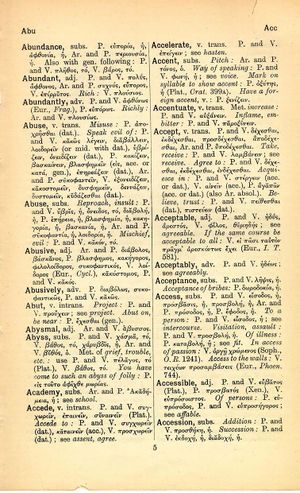accede: Difference between revisions
From LSJ
ἀμήχανον δὲ παντὸς ἀνδρὸς ἐκμαθεῖν ψυχήν τε καὶ φρόνημα καὶ γνώμην, πρὶν ἂν ἀρχαῖς τε καὶ νόμοισιν ἐντριβὴς φανῇ → hard it is to learn the mind of any mortal or the heart, 'till he be tried in chief authority | it is impossible to know fully any man's character, will, or judgment, until he has been proved by the test of rule and law-giving
(CSV3) |
m (Woodhouse1 replacement) |
||
| Line 1: | Line 1: | ||
{{Woodhouse1 | {{Woodhouse1 | ||
|Text=[[File:woodhouse_5.jpg|thumb|link={{filepath:woodhouse_5.jpg}}]] | |Text=[[File:woodhouse_5.jpg|thumb|link={{filepath:woodhouse_5.jpg}}]] | ||
===verb intransitive=== | |||
P. and V. συγχωρεῖν, [[ἐπαινέω | [[prose|P.]] and [[verse|V.]] [[συγχωρεῖν]], [[ἐπαινέω]], [[ἐπαινεῖν]], [[συναινεῖν]] ([[Plato]]). | ||
[[accede to]]: [[prose|P.]] and [[verse|V.]] [[συγχωρεῖν]] (dat.), [[καταινεῖν]] (acc.), [[verse|V.]] [[προσχωρεῖν]] (dat.); see [[assent]], [[agree]]. | |||
}} | }} | ||

